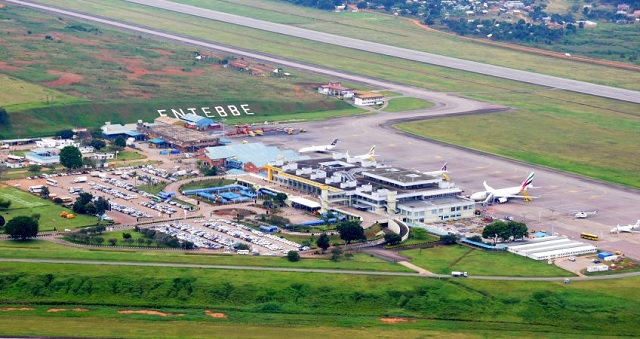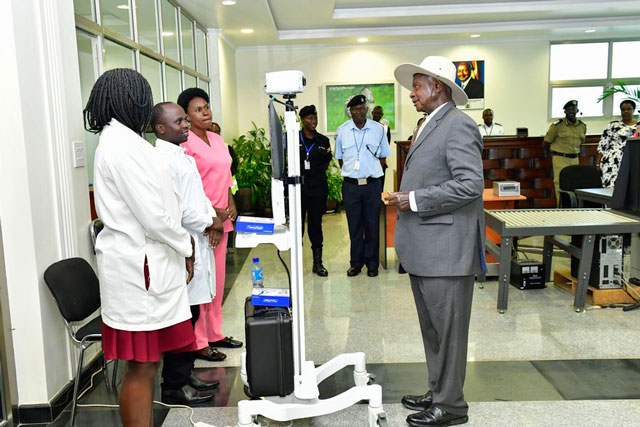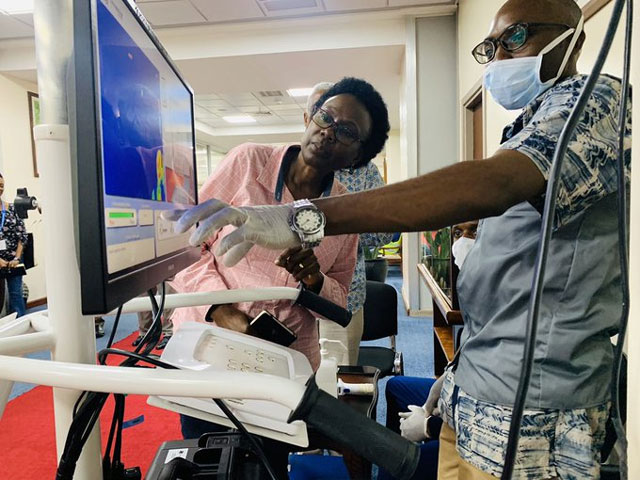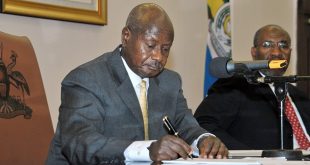
Kampala, Uganda | THE INDEPENDENT | Uganda today extended a nation-wide lock-down to control COVID-19 by 21 days, to May 5th.
It means the 34 measures outlined since March 18 to control the spread of the pandemic will continue to be implemented.
President Yoweri Museveni sounded buoyant as he repeated them in his speech today as he announced the lockdown will continue. ” Right from the beginning, I told you that it is possible to defeat this virus provided we are disciplined and we understand the way in which this virus spreads,” he said
Uganda has so far tested 5,664 persons and 54 have been found positive with the virus. Out of these 4,015 were returnees from abroad, 1,232 were those who interacted with the returnees, and 402 were people who had not travelled or had not been in contact with the returnees, but were people who got worried and volunteered to be tested.
The Ministry of Health is using hydroxychloroquine as a treatment drug for patients that are receiving COVID-19 treatment at three health facilities. The drug is an antimalarial used to treat mild forms of malaria, but can also be used to treat lupus and arthritis.
According to Health Minister Dr Jane Ruth Aceng even if hydroxychloroquine is still undergoing testing, it has the ability to stop the spread of the disease by stabilizing red blood cells so that uptake of oxygen by hemoglobin is promoted.
This is important, she said, since the virus affects the lungs by attacking receptors and entering the blood cells and stopping uptake of oxygen hence causing respiratory difficulty.
Here is the full list of 34 measures Uganda has taken since March 18th to contain the pandemic.
1. Close all the Educational Institutions which account for 15 million young Ugandans;
2. Suspend communal prayers in Mosques, Churches or in Stadia and other open air venues;
3. Stop all public political rallies, cultural gatherings or conferences;
4. Banned Ugandans from moving to or through category one (I) countries that had had a large number of corona cases by that time;
5. Allow returning Ugandans provided they undergo mandatory quarantine, at their cost, for 14 days at a venue identified by the Ministry of Health;
6. Allow the non-agricultural gathering points e.g. factories, hotels, large plantations, markets, taxi-parks, etc to continue and follow the SOPs (Standard Operating Procedures) put out by the Ministry of Health;
7. Discourage the hexagonal, extravagant Ugandan-style weddings; Weddings allowed only for only a maximum of 7 people;
8. Burials could not be postponed, but should be for a maximum of 10 people (close family members);
9. Suspended weekly or monthly markets such as cattle auction markets (ebikomera); and obutare (food markets);
10. At that time, allowed the public transport systems of buses, mini-buses, taxis, boda-bodas, etc., to continue provided they were given SOPs;
11. Suspended all the discos, dances, bars, sports, music shows, cinemas and concerts;

12. Advised the public to maintain hygiene measures such as; not coughing or sneezing in public, no spitting, washing with soap and water or using sanitizers, regularly disinfecting surfaces such as tables, door handles, etc. and not touching your eyes, nose or mouth with contaminated and unwashed hands;
13. Advised the public on good nutrition to strengthen the body defence system;
14. Stopped all passengers coming into Uganda by air, land or water; this affected in-coming planes, buses, taxis or boats. Closed Entebbe International Airport and all other border points of entry except for Cargo airplanes and trucks;
15. Prohibited pedestrians from entry into the country from the neighbouring countries;
16. All public passenger transport vehicles are stopped. i.e. taxis, coasters, buses, passenger trains, tuk-tuks (tri-cycles) and bodabodas;
17. Only food sellers should remain in the markets; the non-food sellers should suspend their activities;
18. Private vehicles should continue but with only 3 people maximum per vehicle;
19. Ambulances, army vehicles, garbage collection vehicles, etc., would continue;
20. Banned the movement of all privately owned passenger vehicles;
21. Suspended the shopping arcades, hardware shops, which gather a lot of people to sell and buy non-food items. These were suspended for 14 days starting on the 1st of April, 2020;
22. Directed all the non-food shops (stores) to close. Only food stores, stores selling agricultural products, veterinary products, detergents and pharmaceuticals should remain open. Home deliveries should, instead, be encouraged;
23. The super-markets should remain open but with clear SOPs that restrict numbers that enter and leave the site at a given time and the handling of trolleys within the super-markets.

24. Established Food Markets in Kampala and the other towns should continue to be open while maintaining social distancing;
25. The sellers must not go home during the 14 days. They must arrange to stay nearby for that duration. It is that mixing that we want to freeze ─ between home, enroute and workplace.
26. Salons, Lodges and garages should also be shut for 14 days from the 1st of April, 2020.
27. Like the farms, factories should remain open. But the owners should arrange for the crucial employees to camp around the factory area for the 14 days. If they cannot do that, let them suspend production for 14 days;
28. Construction sites should continue if they can be able to encamp their workers for 14 days. Otherwise, they should suspend construction for the 14 days;
29. The essential services i.e., the medical, agriculture and veterinary, telecommunication, door-to-door delivery, financial institutions, all media, Private Security companies, cleaning services, garbage collection, fire-brigade, fuel stations, water departments and some KCCA staff should continue to operate;
30. Cargo transport by train, plane, lorry, pick-up, tuku-tukus, bodaboda and bicycle, within Uganda and between Uganda and the outside, must continue but only with minimum numbers, technically needed as follows: Cargo ─ Air-craft ─ only the crew; Lorry ─ not more than 3 persons i.e. driver, turn-boy plus one, etc., as will be directed by the Ministry of Transport, working with the National Task Force on the Coronavirus;
31. URA should also not close business on account of not paying taxes in these 14 days;
32. Gatherings of more than 5 persons are hereby prohibited;
33. Except for cargo planes, lorries, pick-ups and trains, starting with the 31st of March, 2020, at 1900 hours, there will be a curfew throughout the whole of Uganda up to 6:30am;
34. In order to deal with other health emergencies, permission can be sought from the RDC to use private transport to take a sick person to hospital. Additionally, government vehicles that do not belong to UPDF, Police, Prisons or UWA, will be pooled and deployed at the District Health Offices, including the divisions of Kampala, with their drivers, staying in tented compounds, ready to help in those health emergencies. Those vehicles will be under the command of the District Medical Officer;
35. Boda bodas should stop at 2:00pm.
, known as the alert group by the Ministry of Health. The following were the tests, day by day, up to the 13th of April starting with the 21st of March, 2020 when we got the first case:
 The Independent Uganda: You get the Truth we Pay the Price
The Independent Uganda: You get the Truth we Pay the Price


